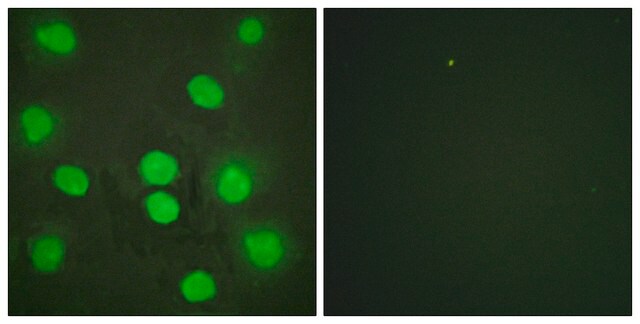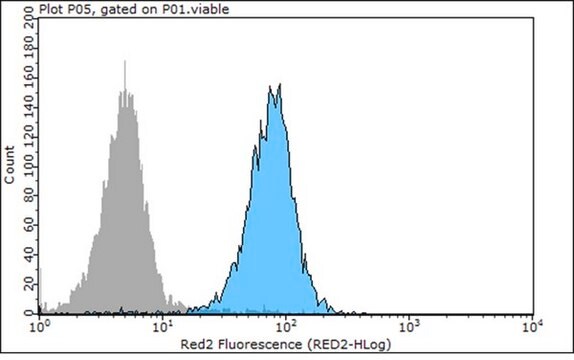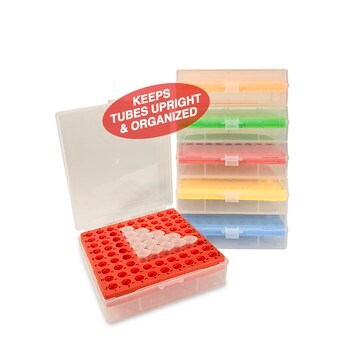ZRB1601
Anti-GATA4 Antibody, clone 1K15 ZooMAb® Rabbit Monoclonal

recombinant, expressed in HEK 293 cells
Synonym(s):
Anti-RelB Antibody, clone 1M14 ZooMAb® Rabbit Monoclonal, GATA-binding factor 4, Transcription factor GATA-4
About This Item
Recommended Products
biological source
rabbit
Quality Level
recombinant
expressed in HEK 293 cells
conjugate
unconjugated
antibody form
purified antibody
antibody product type
primary antibodies
clone
1K15, recombinant monoclonal
description
recombinant, expressed in HEK 293 cells
product line
ZooMAb® learn more
form
lyophilized
mol wt
calculated mol wt 44.57 kDa
observed mol wt ~52 kDa
purified by
using Protein A
species reactivity
mouse, rat, human
packaging
antibody small pack of 25
greener alternative product characteristics
Waste Prevention
Designing Safer Chemicals
Design for Energy Efficiency
Learn more about the Principles of Green Chemistry.
enhanced validation
recombinant expression
Learn more about Antibody Enhanced Validation
sustainability
Greener Alternative Product
technique(s)
affinity binding assay: suitable
flow cytometry: suitable
immunocytochemistry: suitable
immunohistochemistry: suitable
western blot: suitable
isotype
IgG
epitope sequence
C-terminal
Protein ID accession no.
UniProt accession no.
greener alternative category
shipped in
ambient
storage temp.
2-8°C
Gene Information
human ... GATA4(2626)
General description
Specificity
Immunogen
Application
Evaluated by Western Blotting in HEK293 cell lysate.
Western Blotting Analysis: A 1:1,000 dilution of this antibody detected GATA4 in HEK293 cell lysate.
Tested Applications
Western Blotting Analysis: A 1:1,000 dilution from a representative lot detected GATA4 in lysates from U2OS, NIH3T3, and PC12 cells and His/T7-tagged recombinant fragment of Human GATA4.
Immunocytochemistry Analysis: A 1:1,000 dilution from a representative lot detected GATA4 in HepG2 cells.
Immunohistochemistry (Paraffin) Analysis: A 1:100 dilution from a representative lot detected GATA4 in Human testis tissue sections.
Flow Cytometry Analysis: 0.1 µg from a representative lot detected GATA4 in one million U2OS cells.
Affinity Binding Assay: A representative lot of this antibody bound GATA-4 peptide with a KD of 7.3 x 10-9 in an affinity binding assay.
Note: Actual optimal working dilutions must be determined by end user as specimens, and experimental conditions may vary with the end user.
Target description
Physical form
Reconstitution
Storage and Stability
Legal Information
Disclaimer
Not finding the right product?
Try our Product Selector Tool.
Storage Class Code
11 - Combustible Solids
WGK
WGK 1
Flash Point(F)
Not applicable
Flash Point(C)
Not applicable
Certificates of Analysis (COA)
Search for Certificates of Analysis (COA) by entering the products Lot/Batch Number. Lot and Batch Numbers can be found on a product’s label following the words ‘Lot’ or ‘Batch’.
Already Own This Product?
Find documentation for the products that you have recently purchased in the Document Library.
Our team of scientists has experience in all areas of research including Life Science, Material Science, Chemical Synthesis, Chromatography, Analytical and many others.
Contact Technical Service




